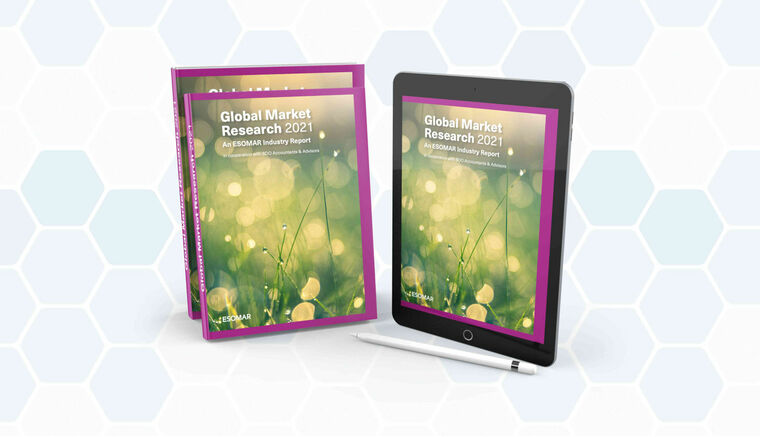Self-regulation - a reliable compass for Data Analytics?
The abundance of data from diverse sources presents both opportunities and obstacles. A proactive self-regulation policy such as the currently under-revision ICC/ESOMAR Code will be pivotal in addressing them.

Article series
Global Data Analytics 2023
- Understanding Europe’s Data Analytics $1bn growth
- The $36bn hegemony of Data Analytics in the US
- Insights in Asia Pacific, set to dominate in 2024
- Rest of the Americas’ journey through the inflationary hurdles
- Inflation curtails promising Middle Eastern and African prospects
- Insights industry: The tech vendors remix
- Self-regulation - a reliable compass for Data Analytics?
- The role of software providers in the insights industry
- From transaction to integration thanks to the digital transformation
This article is an extract from the Global Data Analytics 2023 report. Download the report to read the authors’ perspective in more detail.
Navigating an era of new challenges
As new technologies continue to revolutionise the way data is generated, collected, and analysed, our sector faces an influx of challenges, including those arising from the proliferation of data.
Governmental policymakers might not be able to continually introduce new legal requirements and restrictions to keep up in this age of rapidly changing digital developments. Therefore, professional self-regulation is even more important to ensure environmental, social and governance (ESG) and responsible and ethical data use and analysis. While large corporations might have access to extensive resources for advice, self-regulatory guidelines are also intended for smaller companies to understand the key requirements for maintaining public trust and respect for individuals’ rights.
Big Data and Bias Mitigation
Big data presents unique ethical challenges. The immensity and complexity of big data can lead to inadvertent biases and potentially unethical outcomes in research. As data practitioners tap into massive data repositories, which can contain biases that might not be readily apparent, the responsibility to extract meaningful insights, and thus mitigate bias, is important from both an ethical and practical coverage point of view. Self-regulatory codes and guidelines can aid professionals in navigating the ethical implications of big data, prioritising respect for inclusion, and upholding the principles of transparency, fairness, and integrity.
Managing the Impact of AI and Automation
The proliferation of data is tied to advancements in artificial intelligence (AI) and automation. While these technologies offer unprecedented opportunities for efficient data analysis and trend identification, they also raise concerns about the potential displacement of human expertise and the introduction of new biases and continuation of existing prejudices. AI can be leveraged for enhanced insights, but the human element should be preserved to maintain a nuanced understanding of the behaviour being studied. Even as national and international regulations are being developed, guidance on the ethical application of AI and automation can help to ensure that the key elements of professional standards and ethical considerations are maintained in this new environment.
Cultural Nuance in Cross-national Data
Cross-cultural projects pose challenges in terms of understanding and interpreting data without imposing biases. Self-regulation and ethical frameworks can encourage the adoption of culturally sensitive research methodologies and considerations in data analysis.
Overcoming challenges through self-regulation
The rapidly evolving landscape of insights and analytics calls for a lean and flexible approach to deal with emerging threats and challenges, which becomes even more important with the advent of AI and machine learning techniques. These highlight the need for professional standards even as regulations are being developed, to ensure that researchers and analysts are seen as being trustworthy, by partner industries, regulators, civil society, and the general public.
Self-regulation is key to ensuring a positive and sustainable future for the industry. Self-regulation through the ICC/ESOMAR and national codes, as well as guidelines, promote transparency, integrity, and personal data protection principles to equip researchers and analysts with guidelines that go beyond legislation by explaining their specific responsibilities, thus helping them to tackle the day-to-day challenges, in a responsible manner and mitigate risk.
Three fundamental principles guide data practitioners in the ICC/ESOMAR International Code:
When collecting personal data from data subjects for the purpose of research or analytics, researchers must be transparent about the information they plan to collect, the purpose for which it will be collected, with whom it might be shared, and in what form.
Personal data used for this purpose should be thoroughly protected from unauthorised access and not disclosed without the consent of the data subject.
Data practitioners must always behave ethically and not do anything that might harm a data subject or jeopardise the social and legislative trust and standing the industry has maintained over the years.
Transparency and respect for privacy
Respecting the privacy and confidentiality of personal data is a non-negotiable principle for both research and analytics. ESOMAR/GRBN guidelines require researchers and data analysts to be upfront about the data they collect, its purpose, and any potential sharing arrangements. With a commitment to safeguarding personal data from unauthorised access and maintaining strict confidentiality, it is important to instil a sense of trust, so people feel safe when sharing their data. One example is enabling people to select the level of privacy and data sharing through device and online settings.
As smaller companies might have more limited access to lawyers and compliance resources, ESOMAR and national associations publish advice on how to establish strict data protection protocols and transparent data handling practices that safeguard privacy. These guidelines are particularly relevant to smaller companies and individual consultants who don’t have access to sizeable corporate infrastructure while seeking to maintain professional standards and mitigate the risks associated with data breaches. This type of guidance is also part of self-regulation.
Data Integrity and Quality
High-quality data is essential to both market research and analytics. Both require that findings and interpretation are adequately supported by the data, and both should be able to provide documented evidence that processes are in place for data cleaning and data validation for accuracy and reliability in data collection and analyses. Sufficient technical information to enable clients to assess the validity of the findings and any conclusions drawn is needed for both research and analytics as required by the ICC ESOMAR International Code.
Presenting accurate findings and maintaining transparency are crucial requirements for building trust with our audiences. The ICC/ESOMAR Code, along with national research codes, emphasises the importance of providing clear distinctions between what is a finding, what is an interpretation, and any derived conclusions or recommendations. By adhering to these standards, researchers and analysts ensure that results are communicated transparently and objectively, fostering greater confidence in their practices and methodologies.
Distinguishing Observational Analysis from Direct Marketing Purposes
Both research and analytics can be used to identify specific segments of a population that are more likely to be open to a particular type of product or service. This differs from profiling, which involves very detailed profiles of individuals based on their characteristics, behaviours, and preferences.
ESOMAR highlights the need to maintain a clear separation between market research and direct marketing activities. Research is not interested in the identity of the data subject. By avoiding any overlap with direct marketing, data practitioners preserve the integrity of their work, and in doing so, earn the trust of both clients and participants alike. According to the ICC/ESOMAR Code, non-research purposes means “taking direct action toward an individual whose personal data was collected or analysed with the intent to change the attitudes, opinions or actions of that individual.”
These requirements also apply to analytics, noting that it is more likely to be used for creating detailed profiles of individuals based on their characteristics and behaviour, and thus to be used for risk assessment or personalisation.
Securing the future through the ICC/ESOMAR Code
By incorporating data analytics, the revised Code reflected the tectonic transformation that has brought to life an entirely new approach to research. In an era marked by concerns over data privacy, the responsibilities of research and insights professionals become more significant than ever before. The ICC/ESOMAR Code stands as a beacon of ethical excellence, offering guidance to data professionals as they navigate uncharted digital waters. It continues to foster ethical behaviour, elevate professional standards, and bolster public confidence in this activity. The ICC/ESOMAR code is a principle-based global compass that guides professionals across diverse contexts. Just as the digital revolution knows no borders, ethical responsibility transcends national borders.
In a world propelled by data-driven insights, we believe the ethical compass provided by the ICC/ESOMAR Code is indispensable for all professionals working with personal data. We encourage you to consult ESOMAR’s guidelines and explore how they can be integrated into your daily professional tasks. By upholding the principles of transparency, integrity, and respect for privacy, you contribute not only to the growth of your profession but also to the enduring trust and credibility that form the bedrock of the vital role our common industry has in shaping decisions, policies, and society itself.
Curious to learn more about the Data Analytics sector? Get your copy of the Global Data Analytics report today.
Claudio Gennaro
Senior Advocacy Programmes Coordinator at EsomarClaudio joined ESOMAR as Senior Advocacy Programmes Coordinator. In this capacity he is responsible for coordinating our data protection and privacy advocacy efforts as well as coordinating our compliance support services known as ESOMAR Plus.
Claudio is a certified information privacy professional (CIPP/E) with a background in law, international relations and technology. Prior to joining ESOMAR, he also worked as a data privacy analyst at Tesla and compliance officer in several marketing agencies.
Kathy Joe
Research World Editorial Consultant at EsomarKathy Joe served for many years as Director of International Standards and Public Affairs at ESOMAR before retiring in 2016. She currently still works periodically for ESOMAR as its Editorial Consultant for Research World.
Prior to working for ESOMAR, Kathy worked at The Economist and Euromoney and gained a BSc Hons in Politics and Sociology from the University of Southampton in the UK.
With a passion for research and insights and long experience in working with global teams to formulate editorial content, privacy policies and professional standards, she has worked with research professionals from around the world on far-ranging topics including innovation and best practice in consumer insights, knowledge and strategy.
As ESOMAR Director of International Standards, Kathy led the development and promotion of global research codes and privacy guidelines.
She volunteers for projects with NGOs such as Amnesty International and is a Board Member and Secretary of Dance Connects.
Article series
Global Data Analytics 2023
- Understanding Europe’s Data Analytics $1bn growth
- The $36bn hegemony of Data Analytics in the US
- Insights in Asia Pacific, set to dominate in 2024
- Rest of the Americas’ journey through the inflationary hurdles
- Inflation curtails promising Middle Eastern and African prospects
- Insights industry: The tech vendors remix
- Self-regulation - a reliable compass for Data Analytics?
- The role of software providers in the insights industry
- From transaction to integration thanks to the digital transformation


